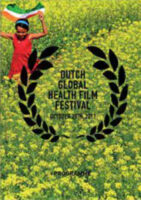Main content
The face of a Ugandan woman fills the screen, her lively smile revealing a missing front tooth. I am at the first Dutch Global Health Film Festival and not the only one. Tickets have sold out quickly and the cinema is crowded with students and health professionals, all sharing an interest in global health. The program includes three sessions with films and panel discussions with experts in the field.

As the first film continues, we learn that the woman’s name is Hellen Baleke. She lost her tooth during one of her fights, as she is one of the few female boxers in the country. She started boxing as a means of self-defence in the slums of Kampala but now only fights inside the ring. And with success: if women received medals for the fights they won, like their male counterparts, she would have had plenty by now. For Hellen, boxing is about more than winning medals alone. Her fight is also for gender equality in this popular sport in Uganda. And with success, as director Chrisje Sterk tells us after the viewing of the film. Together with her sister Diana, she was the first woman to represent Uganda during the 2014 Women’s World Boxing Championships. The fact that she almost set a world record in giving up – in one of her fights she threw in the towel after II seconds – is not important. She has won my respect.
‘The Checklist effect’ is a documentary on surgical needs worldwide. In a journey around the world, we see how surgical treatments can be improved. The needs are diverse, such as in Guatemala where we see the effects of malfunctioning surgical equipment. The surgical team is not able to sterilize surgical instruments because of power-cuts, and a patient with pulmonary embolus dies because of a lack of post-operative monitoring and a broken alarm system. The documentary is largely based on the book by surgeon Atul Gawande on the development of the WHO Surgical Safety Checklist. We see how a peri-operative checklist is used in the US to improve communication among different members of the surgical and anaesthetic team, thereby improving patient safety. And in Mongolia, where surgical training lasts only 3 months (!), training programs are implemented to improve the quality of care. The importance of safe surgery and anaesthetic care is illustrated in the closing credits, where we learn that almost half of the film’s casting team and crew have checkmarks behind their names, indicating that they underwent surgery at some point during their lives.
The impressive ‘Minutes to die’ documentary discusses a neglected tropical health issue, the snake bite. We see several victims of snake bites, such as an African family which lost its first child due to a snake that also severely physically disabled their second child and an Indian father in life-threatening condition after being bitten by a snake. Dr David Williams, present during the discussion after the film, is a strong advocate of focusing more attention on the devastating effects of snake bites. He explains that even though we can’t eliminate snakes, as they are an important part of our ecosystem, we can create more awareness to prevent snake bites. Also, we should invest in the production of anti-venom, which at present is either not available, not efficient, or too expensive. The documentary shows how his protracted lobbying efforts for the inclusion of snakebite envenoming in the WHO list of Neglected Tropical Diseases finally paid off in 2017.
‘The Great Escape’ is a short film produced by The Joep Lange institute. It shows the role of technology in pursuing equity and portrays the cell phone as being ‘the biggest equalizer’. We see a young Kenyan woman, mother of 5 children and HIV positive. She struggles to take care of her family. To be able to pay for her hospital check-ups and treatment, she uses M-tiba, her phone wallet, which keeps her from spending money on other things. As she puts it, ‘If it were not for the wallet, I would not be alive’.
The film ‘Breaking the chains’ shows the heart-warming dedication of a local Indonesian team whose mission is to free mentally ill people who are held in ‘pasung’, the local term for the (illegal) practice of physical restraint and confinement. Their illness being misinterpreted as possession by a ‘jinn’, they are neglected and kept from society in a small hut or shed, sometimes for years on end. Local health workers team up with people who suffered from mental health disorders themselves and visit the patients, many of them hidden in extreme circumstances in remote rural areas. They offer treatment and compassion and try to convince their families to literally break their chains, sometimes with success, although poor adherence to medication and relapse make the job difficult and time-consuming. After the film, director Dr. Erminia Colucci tells us she will be going back to Indonesia to follow up on the people featured in the documentary, so hopefully we can expect a sequel soon. Credits to the organizers of the film festival for their selection of impressive documentaries and facilitation of inspiring discussions. Looking forward to the next edition!


















































